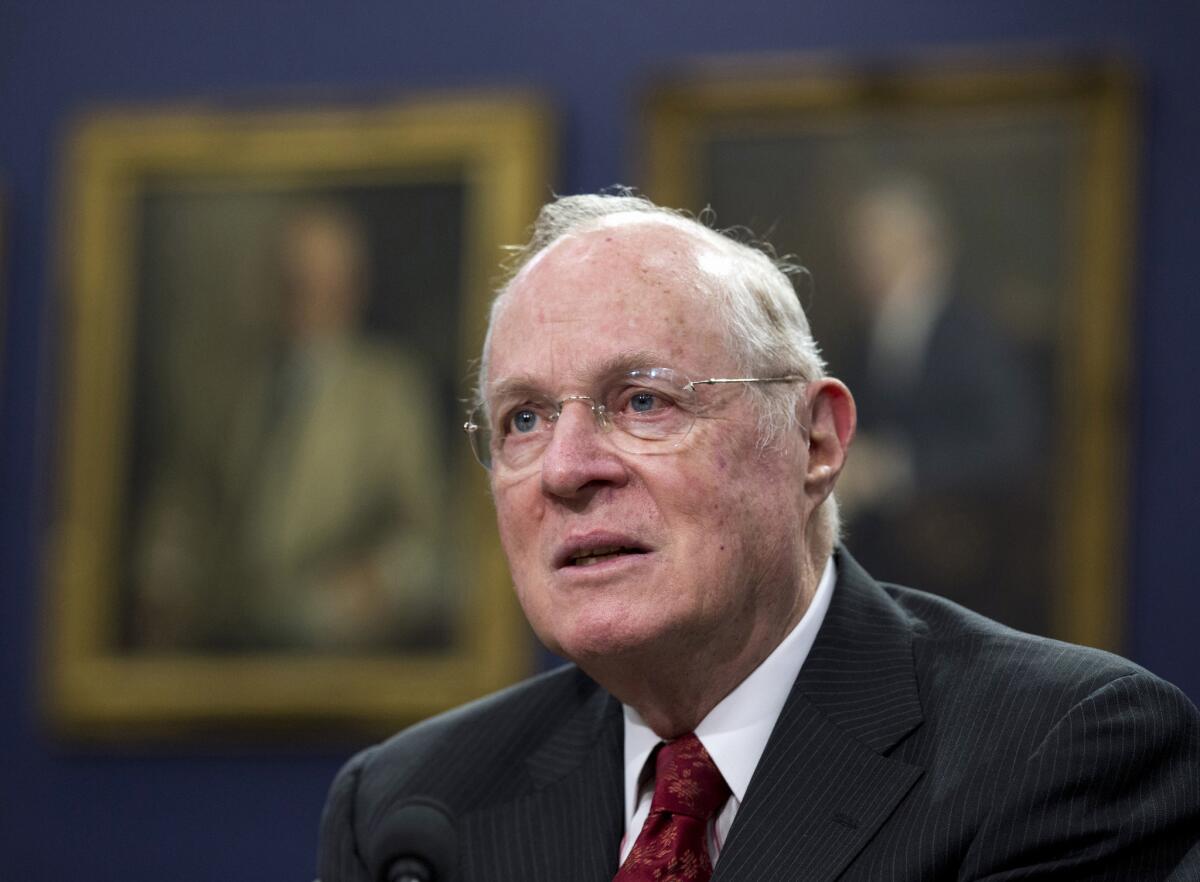Op-Ed: How Justice Kennedy could have baked a better fortune cookie

Supreme Court Associate Justice Anthony Kennedy testifies on Capitol Hill in Washington on March 23.
- Share via
Last week’s historic Supreme Court decision Obergefell vs. Hodges gave supporters of marriage equality a deserved victory, but one based on unfortunate reasoning. Yes, Justice Anthony M. Kennedy arrived at the right conclusion, but his analysis was at times laughable in its freewheeling, extra-legal pontification. And his constitutional approach was misguided, giving the conservative justices an out: In defeat, they did not have to confront the substantive case for same-sex marriage.
There are two basic constitutional arguments for same-sex marriage. One is that marriage is a “fundamental right,” and the other is that denying same-sex couples access to marriage violates the equal protection clause.
While Kennedy hinted at both arguments, he focused on the former, and so wandered into precarious terrain. Courts are supposed to declare that a right is fundamental only if it is deeply rooted in tradition. If judges are not so constrained, it’s all too easy for them to declare new rights based on their personal preferences.
While marriage itself may be fundamental, there is no tradition-based argument for extending access to same-sex couples. So Kennedy smoothed over this problem by philosophizing on the beauty of marriage without analyzing why such beauty dictates a right to same-sex marriage. “In forming a marital union, two people become something greater than once they were,” he wrote, adding that the decision to marry “shapes an individual’s destiny.” He also cited Cicero and Confucius to establish the role of marriage in society.
This rhetorical approach left Kennedy open to mockery, with Justice Antonin Scalia comparing Kennedy’s ruminations to “mystical aphorisms of the fortune cookie.” It also bolstered the perception that Kennedy was deciding the law based on his own philosophical views.
Chief Justice John G. Roberts Jr., writing in dissent, compared the Obergefell decision to Lochner vs. New York (1905). In that case, the Supreme Court held that a law limiting the hours bakers could work in a given day or week violated the “fundamental right” to enter into contracts. Lochner launched a now-vilified era of constitutional law in which the Supreme Court aggressively used “fundamental rights” to strike down progressive economic regulations passed by the elected legislature.
The Lochner era is synonymous with anti-democratic judicial activism. It also serves as a reminder that when judges rule based on policy preferences rather than legal precedent and reasoning, progressive causes can just as easily suffer as benefit.
Given Kennedy’s flimsy fundamental rights analysis, the dissenters were able to frame opposition to marriage equality as deriving from high-minded ideals like democracy and judicial restraint. Even if marriage is beautiful, they asked, why should the courts rather than the people and their representatives decide the question?
Kennedy could have defanged the conservative opposition if only he’d chosen another path: the 14th Amendment’s equal protection clause.
When the government draws legal lines based on benign distinctions — such as setting up different tax rates for people in different income groups — courts will uphold the policy as long as it has a “rational basis.” And when a law targets vulnerable minorities based on immutable qualities such as sex, race or national origin, courts require more than rationality; they require a substantial or compelling reason.
Imagine if Kennedy had said there is no rational basis for the unequal treatment same-sex couples experience when they want to marry. The conservatives would have tripped all over themselves trying to invent one. (Animus doesn’t count.)
As the jurist Richard Posner noted in his own opinion striking down various states’ same-sex marriage bans under the equal protection clause, “The only rationale the states put forth with any conviction ... is so full of holes it cannot be taken seriously.”
Posner explained that although the marriage bans purported to protect family stability and children’s welfare, they ended up severely harming the tens of thousands of children of same-sex couples while benefiting nobody in particular.
Imagine if that were what the conservatives had to rebut; they couldn’t have so easily cloaked their hollow defense of discrimination in the rhetoric of judicial minimalism.
Or what if Kennedy had gone one step further and said that, because of the history of discrimination against the gay community, gays and lesbians deserved heightened legal protections. This would have given LGBTQ plaintiffs a weapon in challenging discriminatory government practices in areas of law such as employment and housing. It would have also required conservatives opposed to same-sex marriage to claim that being gay is not an immutable characteristic, or to downplay the undeniable history of prejudice and discrimination that gays and lesbians have faced.
To many, the outcome of Obergefell vs. Hodges is such a cause for celebration that these legal nuances might seem trivial. But last week’s victory could have been yet more profound. In a time when national discussion of gay rights is at its apex, an opinion based on equality under the law would have forced critics of gay marriage to come to terms with the irrationality of discriminating against gay, lesbian and bisexual people. Instead, they get to grumble in defeat about activist courts and threats to democracy.
Ariel Schneller is a criminal defense attorney for the Legal Aid Society in Queens, N.Y.
Follow the Opinion section on Twitter @latimesopinion and Facebook
More to Read
Sign up for Essential California
The most important California stories and recommendations in your inbox every morning.
You may occasionally receive promotional content from the Los Angeles Times.










